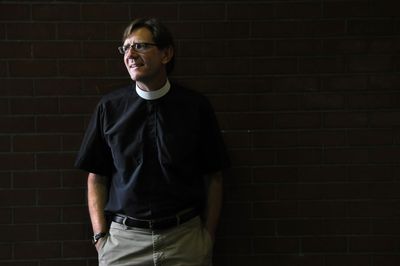Finding comfort in the good news
Brian Prior explores how to find peace through embracing the grace of life

Brian Prior, a 49-year-old Episcopal priest, was tapped three years ago for a leadership position in the national church. He also organizes national youth events and leads spiritual retreats throughout the United States. And he’s still pastor for the Episcopal Church of the Resurrection in Spokane Valley. Prior recently took a breather from his busy schedule for this interview. He pondered the good news emerging from the country’s bleak economic situation. And he talked about helping people who stand on financially shaky ground. Here’s an excerpt:
•I knew things were out of kilter when a number of folks were buying hugely expensive homes. A friend who is a contractor was just booming. I said, “How do people afford these?” He said, “I don’t know if they can afford them, but the money is there.” It was not just a couple of folks, but a whole swath, living beyond their means.
•All the way through Scripture, and certainly historically, when we move beyond our means, the end comes quickly.
•Writer John Philip Newell has this simple mantra: “There are those who have enough, and there are those who do not have enough, and there are those who have too much. It’s the responsibility of all three to make sure that everybody has enough.”
•My grandparents lost the family business during the Depression. Through this experience my grandfather engrained in me a sense of stewardship: “Take care of it, and it will last forever.” And he embodied the sense of generosity: “You help folks because you never know when you will need help yourself – and you will.” He went on to rebuild his business that was then passed on to two more generations.
•Many of the seniors in our church went through similar circumstances in the Depression. They are the best stewards. They always ask: “Do we really need that? Can we reuse that? Can we think of another way that won’t cost us any money?”
•Often, people who find themselves with tragedies feel incredibly alone. They don’t think anybody is there for them. That’s why when we spend too much time on other issues and not on the issues of embracing all of God’s beloved, we’re wasting our time.
•Why do people talk about their own loss when you tell them about yours? Their intentions are good. They want to give a sense they can relate to where you are. But what you really need is not the person to be relatable but to be present with you.
•The first question we often overlook is “How are you?” You need to keep asking that question.
•My brother lost his job. I call him every week and say how are you doing, need help with anything? I just want to be focused on him so he feels like someone really cares.
•Advice is the last thing people need. When someone is not seeking it, it is not helpful.
•When people say, “We live in the hardest times ever,” it’s like, “Are you kidding me?” Read some medieval history.
•The reality is we all have challenges. We also have joy and moments of grace. In the totality of who we are, it’s a mixture of both. The key is to not over-exaggerate the crisis and under-exaggerate the good news. We say, “Good Lord, deliver me” but we’re not saying enough “Thank you, Lord, this is great.”
•We’ve become entertained by crisis. Not to be nostalgic, but we once loved to watch “Ozzie and Harriet,” “Lucille Ball” and “The Cosby Show.” Now we watch families where it’s wife swap or Kate and what’s-his-name at 8.
•When someone’s house burns down, they say, “Thank goodness our family is safe.” This is a bit of a fire now in our economy and people are saying, “We may not have what we once had. We may not have the things we dreamed we would, but we have family. We have friends.” This is part of the reprioritization. So that’s great news.
•As a pastor, I can spend all my time talking about the awful things, but I’m really here to talk about the good news. Where is the redemption from this? We can’t just stay on Good Friday. My job is to help you say, “Hey, there’s Easter here.”
•I don’t believe spending more is the answer. Spending to help people in need, spending to get things moving, yes. Spending so the stock market can be back at 14,000 or have more McMansions or live beyond our means or not be the good stewards – no.
•Folks often ask me why I travel great distances, sleep on hard mattresses, eat bad food and spend a week of 24-hour days with groups of young people. It’s because I get to watch the transformation of appreciation. Young folks always are more grateful for their families, their friends, their lives.
•The girls I coach on the Freeman Lady Scotties basketball team – let me tell you our tragedy. We got all the way to the second-to-last game before the championship game. Four seconds left. We’re down by two points. Our senior star shoots the ball, ties the game. Two seconds left; (we) throw the ball in. The buzzer sounds. The ref calls a foul on (our) senior. The ref says shoot the free throw. We said, “No, the buzzer sounded. The game was over.” This girl (on the other team) shoots in the free throw. Game over. The emotional devastation was huge.
About 20 minutes later, they were having fun. New life was there. They had the ability to say, “This was unjust and all that stuff, but what are you doing tonight, can I wear that shirt?” They were ready to move on. They were not going to let injustice dictate how they live their lives.